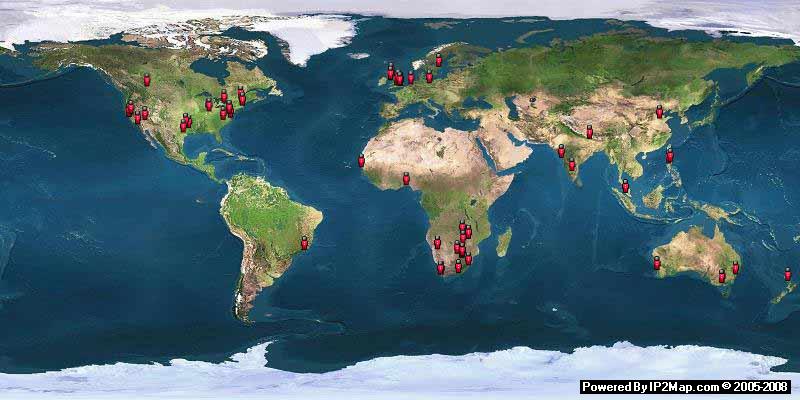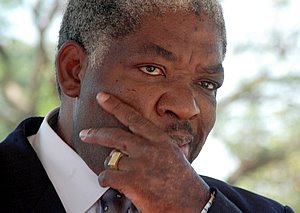Koinange: Mugabe smashed dreams of Zimbabwe, all Africans
POSTED: 1640 GMT (0040 HKT), April 19, 2007
Story Highlights
Editor's note: In our Behind the Scenes series, CNN correspondents share their experiences in covering news and analyze the stories behind the events. This week marked Robert Mugabe's 27th year in power in Zimbabwe. Here, CNN Africa correspondent Jeff Koinange shares his perspective on Mugabe's reign.
DAR ES SALAAM, Tanzania (CNN) -- I was 14 years old in 1980 and vividly recall that historic day on April 18 when the southern African nation of Rhodesia became independent Zimbabwe.
I remember the British flag being lowered and the Zimbabwean one being raised. To me, it seemed there wasn't a dry eye in the crowd at Rufaru Stadium in the country's newly named capital, Harare, previously known as Salisbury.
Rhodesia was named after the British financier-turned-philanthropist, Cecil Rhodes, and was a bastion of white settler rule with commercial farms, producing everything from tobacco to maize. Africa's latest independent republic rightfully boasted the title: southern Africa's bread basket. (Audio slide show: 'The man who ruined prosperous nation')
Among the guests at the stadium that night was reggae superstar, Bob Marley and the Wailers. Zimbabweans went wild as Marley took to the stage, belting out his song "Zimbabwe."
Watching these events unfolding on my black and white TV in not-too-distant Kenya, I thought what a great feat this nation had just accomplished.
Also impressive for me that night was the man speaking at the podium, the bespectacled, articulate, smartly dressed and newly elected prime minister of independent Zimbabwe: Robert Gabriel Mugabe.
His speech was like nothing I'd ever heard. His diction, impeccable -- his command of the English language, inspirational.
Mugabe was the toast of his nation that night, and the envy of millions across Africa. In the minds of most, he could do no wrong having inherited a stable economy, a solid infrastructure and an agriculturally rich nation.
How wrong they turned out to be.
Mugabe cuts off 'nose to spite face'
Less than three decades later, Mugabe continues in power at the age of 83 years old despite squandering the post-independence inheritance.
In 2000, he ordered the invasion of commercially owned white farms -- what critics say was a huge mistake. Those farmers who didn't get killed or injured fled the country in droves.
The world cried foul -- in particular, Zimbabwe's former colonial power, Britain. The United States chipped in as well, and imposed sanctions on the government.
Mugabe's answer was to tighten his grip on power.
I was in Zimbabwe for those first farm invasions in April 2000. What I saw was a country in a state of self-strangulation. One of the white farmers being forced off his farm told me: "Mugabe's about to cut off his nose to spite his face."
At least 12 white farmers were killed in the next few months. Months later, the confiscated farms ended up in the hands of Mugabe's close allies. Few of them had experience farming and the land quickly deteriorated to the point of lying barren.
Mugabe also clamped down on just about everything and everyone he felt was a threat, from lawyers to doctors to teachers and nurses. He even went after the churches.
I continued to cover Zimbabwe's downward spiral, from the presidential elections in 2002 that saw Mugabe defeat his opponent, Morgan Tsvangirai. It was an election that was seen by international monitors as largely flawed.
I returned again for the 2005 parliamentary elections in which the opposition lost badly, leading to deep divisions. Mugabe laughed off the win saying, "No one can beat me, not now, not ever."
Some of our reports infuriated him and it was just a matter of time when Mugabe would turn on us. In 2003, he expelled most Western broadcasters from reporting within Zimbabwe.
"We consider the CNN and the BBC as enemy agents," was what Zimbabwe's ambassador to the United States, Machivenyika Mapuranga, said as he was being interviewed live on CNN recently.
'Millionaires go to bed hungry'
Zimbabweans have been fleeing their country across the border into South Africa in large numbers.
The United Nations estimates there are now more than three million Zimbabwe exiles in South Africa alone. That's about one-fourth of Zimbabwe's population. Many more have fled to Europe, Australia, the United States and Canada.
What Zimbabweans are leaving behind is a country spiraling out of control. Inflation is the highest in the world -- at more than 1,700 percent. The country's currency -- the Zimbabwe dollar -- is being printed so fast that Morgan Tsvangirai, the country's opposition leader, declared, "Zimbabwe is the only nation in the world where millionaires go to bed hungry."
Eight out of 10 Zimbabweans are out of work, according to the CIA fact book, which profiles the countries of the world. Many can't afford to send their children to school and life expectancy due to the onslaught of HIV-AIDS, as well as the current economic woes, is among the lowest in the world. (Read about Zimbabweans so desperate for food they eat rats)
Add to all this what happened just weeks ago: the battered, bruised and bloodied images of opposition members who'd been savagely attacked while in police custody.
Mugabe had managed with this single incident to turn his splintering opposition into global heroes. Whatever Mugabe's intentions had been, these pictures, Africa watchers say, had shown a gross miscalculation on his part and a possible sign he may be starting to lose his grip.
Mugabe has not backed down, saying police have the "right to bash" protesters.
Is this the 'end game'?
Some in Zimbabwe see these latest events as the beginning of the end for the long-time leader.
"I hope these are pangs of birth for a new Zimbabwe and that this dictator must be brought down, brought down by peoples' power," said Pius Ncube, one of Mugabe's most outspoken critics, who is the Archbishop of the southern Zimbabwe city of Bulawayo.
However, not every one believes this will happen.
Sekai Holland, a 64-year-old mother of two children and grandmother of 10, was among the opposition leaders who were badly beaten.
"I really think that for people to assume that this is the end game is quite silly -- unless efforts are done to ensure that Mugabe understands and accepts that," she said.
Any efforts to that end would have to come from other presidents in Africa, she said. "Unless that can be done, there is really no end game here. He will continue to abuse until I don't know, Zimbabwe is sitting down because right now we are on our knees."
Africa analysts say the future of Zimbabwe -- with or without Mugabe -- is crucial due to the possible spillover effect across Africa.
"Zimbabwe is on the skids," said political analyst Moeletsi Mbeki. "The only positive thing is that there is a bottom to the skids."
That bottom could be what some experts fear most -- that Zimbabwe, which literally means "House of Stone," could come crumbling down to its foundations.
Yahoo! Mail is the world's favourite email. Don't settle for less, sign up for your free account today.












No comments:
Post a Comment